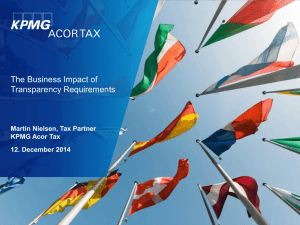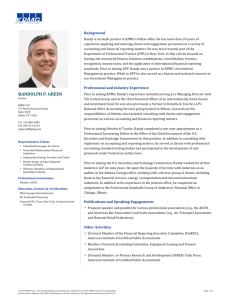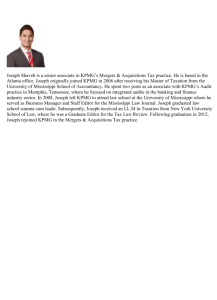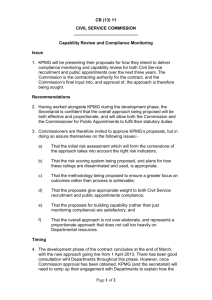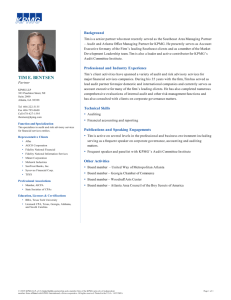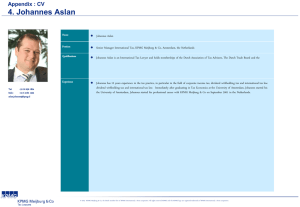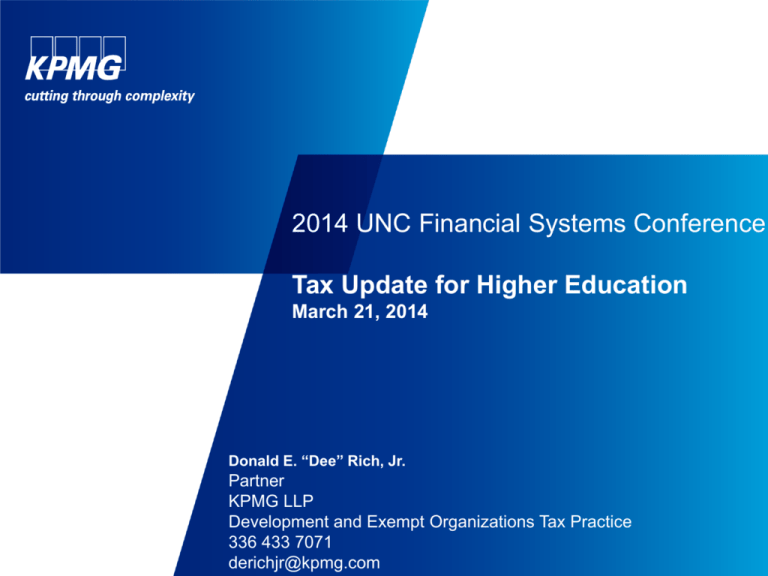
2014 UNC Financial Systems Conference
Tax Update for Higher Education
March 21, 2014
Donald E. “Dee” Rich, Jr.
Partner
KPMG LLP
Development and Exempt Organizations Tax Practice
336 433 7071
derichjr@kpmg.com
© 2014 KPMG LLP, a Delaware limited liability partnership and the U.S. member firm of the KPMG network of independent member firms affili ated with
KPMG International Cooperative (“KPMG International”), a Swiss entity. All rights reserved. Printed in the U.S.A.
Notice
ANY TAX ADVICE IN THIS COMMUNICATION IS NOT
INTENDED OR WRITTEN BY KPMG TO BE USED, AND
CANNOT BE USED, BY A CLIENT OR ANY OTHER PERSON
OR ENTITY FOR THE PURPOSE OF (i) AVOIDING
PENALTIES THAT MAY BE IMPOSED ON ANY TAXPAYER OR
(ii) PROMOTING, MARKETING OR RECOMMENDING TO
ANOTHER PARTY ANY MATTERS ADDRESSED HEREIN.
You (and your employees, representatives, or agents) may disclose to any and all persons,
without limitation, the tax treatment or tax structure, or both, of any transaction described in the
associated materials we provide to you, including, but not limited to, any tax opinions,
memoranda, or other tax analyses contained in those materials.
The information contained herein is of a general nature and based on authorities that are subject
to change. Applicability of the information to specific situations should be determined through
consultation with your tax adviser.
© 2014 KPMG LLP, a Delaware limited liability partnership and the U.S. member firm of the KPMG network of independent member firms affili ated with
KPMG International Cooperative (“KPMG International”), a Swiss entity. All rights reserved. Printed in the U.S.A.
2
Agenda
Fringe Benefits
Impact of DOMA on benefits
Forms 1099 and 1098-T: Minimize Penalty Risk
Other Current Developments
Case Studies
© 2014 KPMG LLP, a Delaware limited liability partnership and the U.S. member firm of the KPMG network of independent member firms affili ated with
KPMG International Cooperative (“KPMG International”), a Swiss entity. All rights reserved. Printed in the U.S.A.
3
Fringe Benefits
4
Fringe Benefit Rules
Employer-provided benefits given to a person in
connection with providing service are included in
income as compensation unless specifically excluded
elsewhere
− Assume taxable unless specifically excluded
− Reg 1.61-21
− Gifts
© 2014 KPMG LLP, a Delaware limited liability partnership and the U.S. member firm of the KPMG network of independent member firms affili ated with
KPMG International Cooperative (“KPMG International”), a Swiss entity. All rights reserved. Printed in the U.S.A.
5
Excludible Fringe Benefits
Section 132
− De minimis
− Working Condition
− Employee Discounts
− No additional cost benefit
© 2014 KPMG LLP, a Delaware limited liability partnership and the U.S. member firm of the KPMG network of independent member firms affili ated with
KPMG International Cooperative (“KPMG International”), a Swiss entity. All rights reserved. Printed in the U.S.A.
6
De Minimis
Definition of employee
Infrequent
Low value
© 2014 KPMG LLP, a Delaware limited liability partnership and the U.S. member firm of the KPMG network of independent member firms affili ated with
KPMG International Cooperative (“KPMG International”), a Swiss entity. All rights reserved. Printed in the U.S.A.
7
Working Condition Fringe
Section 62(c); Reg. 1.62-2
Section 132(d); 1.132-5
Accountable plan vs nonaccountable plan
Substantiation requirements
− Substantiate business reason for travel/expense
− Substantiate amount
− Reasonable timing for substantiation
− Per diem rules
− Advances required to be paid back
© 2014 KPMG LLP, a Delaware limited liability partnership and the U.S. member firm of the KPMG network of independent member firms affili ated with
KPMG International Cooperative (“KPMG International”), a Swiss entity. All rights reserved. Printed in the U.S.A.
Working Condition Fringe
Reasonable expenses for the employee as an
employee of the trade or business.
Meals
− Same day travel
− Two employees
− Spousal Travel
© 2014 KPMG LLP, a Delaware limited liability partnership and the U.S. member firm of the KPMG network of independent member firms affili ated with
KPMG International Cooperative (“KPMG International”), a Swiss entity. All rights reserved. Printed in the U.S.A.
9
Free Meals and Lodging
Section 119
− Meals or lodging for employer’s convenience (NOT
compensatory reasons)
− On employer’s premise
Discrimination
− No discrimination rule on lodging
− Section 119 passes through 132(e)(2) – discrimination
rule applies
© 2014 KPMG LLP, a Delaware limited liability partnership and the U.S. member firm of the KPMG network of independent member firms affili ated with
KPMG International Cooperative (“KPMG International”), a Swiss entity. All rights reserved. Printed in the U.S.A.
10
Section 119 - Meals or Lodging Furnished for the
Convenience of the Employer
General Rule - The cost of employer-provided meals and
lodging is excluded from the employee’s gross income if
for the convenience of the employer:
− Meals are furnished at the employer’s business premises, or
− Lodging is required as a condition of employment and furnished on
the business premises of the employer.
“Convenience of the employer” - If the employee’s
presence on the job site is required for performing duties
as an employee of the employer, or where the employee is
required to be available for emergency calls.
“Business premises of the employer” - An integral part of
the employer’s business property or a place where the
employer carries on business activities
− Significant activities must take place at the site
© 2014 KPMG LLP, a Delaware limited liability partnership and the U.S. member firm of the KPMG network of independent member firms affili ated with
KPMG International Cooperative (“KPMG International”), a Swiss entity. All rights reserved. Printed in the U.S.A.
11
Section 119 - Meals or Lodging Furnished for the
Convenience of the Employer
Educational Institution Employees
− Employees of educational institutions can exclude the
cost of qualified campus lodging if:
Lodging is located on or near the campus, and
The employee pays rent for the taxable year of at least 5% of
the appraised lodging value, or
Rent charged to the employee is comparable to rent charged by
the institution to students or non-employees.
© 2014 KPMG LLP, a Delaware limited liability partnership and the U.S. member firm of the KPMG network of independent member firms affili ated with
KPMG International Cooperative (“KPMG International”), a Swiss entity. All rights reserved. Printed in the U.S.A.
12
Education Benefits
Section 117
Section 127
− Discrimination rules apply
− Broad array of classes available
Section 132(d)
− No discrimination rules
− Limited to improving “current job skills” – watch
education that automatically prepares for other career
© 2014 KPMG LLP, a Delaware limited liability partnership and the U.S. member firm of the KPMG network of independent member firms affili ated with
KPMG International Cooperative (“KPMG International”), a Swiss entity. All rights reserved. Printed in the U.S.A.
13
Other Fringe Benefits
Planes, trains, and automobiles
Executive dining rooms
Club dues
Tickets
© 2014 KPMG LLP, a Delaware limited liability partnership and the U.S. member firm of the KPMG network of independent member firms affili ated with
KPMG International Cooperative (“KPMG International”), a Swiss entity. All rights reserved. Printed in the U.S.A.
14
Spousal Travel
Disney case
− Is spouse really along to perform a business function?
− Facts and circumstances but hard to argue
Section 274(m)(3)
− No deduction for spouse to travel unless also an
employee traveling on business
− Section 274(e) – generally deductible if included in
employee income (watch company plane rules)
Section 1.61-21(a) – if fringe is provided because of the
service of another person, that person must include the
FMV of the benefit in income. Definition of “employee” very
broad for this purpose
© 2014 KPMG LLP, a Delaware limited liability partnership and the U.S. member firm of the KPMG network of independent member firms affili ated with
KPMG International Cooperative (“KPMG International”), a Swiss entity. All rights reserved. Printed in the U.S.A.
15
DOMA
16
Impact of DOMA on Benefits
Background
− In June 2013, the U.S. Supreme Court struck down
Section 3 of the Defense of Marriage Act (“DOMA”) as
unconstitutional.
− Section 3 of DOMA stated that the federal definition of
marriage meant “only a legal union between one man
and one woman…”
− Ruling allows individuals in legal, state-sanctioned
same-sex marriages to receive the same federal
benefits as individuals in opposite-sex marriages.
© 2014 KPMG LLP, a Delaware limited liability partnership and the U.S. member firm of the KPMG network of independent member firms affili ated with
KPMG International Cooperative (“KPMG International”), a Swiss entity. All rights reserved. Printed in the U.S.A.
17
Impact of DOMA on Benefits
Federal Treatment of Same-Sex Marriages
− August 2013 the IRS announced that all legal same-sex
marriages will be recognized for federal tax purposes,
even if individuals reside in a state that does not
recognize same sex marriage. (Rev. Rul. 2013-17)
New rule applies as of September 16, 2013.
Individuals in legal same-sex marriages will be treated as
married for all federal tax purposes.
− Guidance only applies to legal same-sex marriages, and
not to domestic partnerships, civil unions, or similar
formal relationships recognized under state law.
− December 2013 Notice 2014-1 application of “Windsor”
to cafeteria plans, FSAs, and HSAs.
© 2014 KPMG LLP, a Delaware limited liability partnership and the U.S. member firm of the KPMG network of independent member firms affili ated with
KPMG International Cooperative (“KPMG International”), a Swiss entity. All rights reserved. Printed in the U.S.A.
18
Impact of DOMA on Benefits
Impact on Qualified Retirement Plans
− Governed under Section 401(a) covering employees,
but provide spouses with a number of rights:
Qualified joint and survivor annuities
Qualified pre-retirement survivor annuities
Qualified domestic relations orders
Beneficiary designation
Loan consent
− How should a plan sponsor determine who is
married?
© 2014 KPMG LLP, a Delaware limited liability partnership and the U.S. member firm of the KPMG network of independent member firms affili ated with
KPMG International Cooperative (“KPMG International”), a Swiss entity. All rights reserved. Printed in the U.S.A.
19
Impact of DOMA on Benefits
Impact on Health Plans
− The value of health plan provided to same-sex spouse
is not taxable.
Employers no longer are required to impute income on the fair
market value of health benefits provided to an employee’s
same-sex spouse.
Applies retroactively to open tax years
Recognizes the employer is not required to cover
spouses in welfare benefit plans
Employers may – but are not required – to file
amended employment tax returns or claims for refund
of overpaid taxes
© 2014 KPMG LLP, a Delaware limited liability partnership and the U.S. member firm of the KPMG network of independent member firms affili ated with
KPMG International Cooperative (“KPMG International”), a Swiss entity. All rights reserved. Printed in the U.S.A.
20
Impact of DOMA on Benefits
Other welfare benefit plans similarly impacted:
− Dental and vision plans
− Qualified tuition reduction plans
− Meals and lodging provided to employees on business
premises
− Fringe benefits including qualified transportation fringe
benefit, moving expenses, employee discounts
− Pre-tax participation in Section 125 cafeteria plans,
including flexible spending accounts
© 2014 KPMG LLP, a Delaware limited liability partnership and the U.S. member firm of the KPMG network of independent member firms affili ated with
KPMG International Cooperative (“KPMG International”), a Swiss entity. All rights reserved. Printed in the U.S.A.
21
Impact of DOMA on Benefits
Notice 2013-61 – Streamlined employment tax refund
procedures
− Administrative options for overpaid employment taxes
Current year method
Prior year correction method
− Employers may claim a credit or refund of overpaid
employment taxes using Forms 941-X and W-2C
− Employees may claim overpaid income taxes paid using
Form 1040X
© 2014 KPMG LLP, a Delaware limited liability partnership and the U.S. member firm of the KPMG network of independent member firms affili ated with
KPMG International Cooperative (“KPMG International”), a Swiss entity. All rights reserved. Printed in the U.S.A.
22
Information Reporting
Penalties
23
Increased Penalties = Increased Risk
Penalties increased, effective for information returns required
to be filed on or after January 1, 2011
− Applies to calendar year 2010 Forms 1099 & 1098
− Big impact on initial Form 1098-T penalty notices
Late filing or missing / incorrect information (e.g. TINs)
Those paper returns filed in excess of 250 (must be e-filed)
Section 6721 – Filings with IRS
− Generally $100/failure (time sensitive; $30/$60/$100)
− $1.5M annual max (increase from $250k)
Section 6722 – Statements furnished to payees
− Generally $100/failure (time sensitive; $30/$60/$100)
− $1.5M annual max (increase from $100k)
© 2014 KPMG LLP, a Delaware limited liability partnership and the U.S. member firm of the KPMG network of independent member firms affili ated with
KPMG International Cooperative (“KPMG International”), a Swiss entity. All rights reserved. Printed in the U.S.A.
24
Increased Penalties = Increased Risk (cont.)
Annual maximum increase from $350k to $3M per
entity
Adjusted for inflation after 2012 & every 5th year
thereafter
− An IRS notice has yet to be issued regarding an
adjustment
Intentional disregard penalty under §§6721 & 6722
− For 1099-MISC and 1098-T reporting failures: for each
information return, the greater of $250 or 10% of
aggregate amounts not reported correctly
− No annual maximum
© 2014 KPMG LLP, a Delaware limited liability partnership and the U.S. member firm of the KPMG network of independent member firms affili ated with
KPMG International Cooperative (“KPMG International”), a Swiss entity. All rights reserved. Printed in the U.S.A.
25
Vendors and Other
Payments:
1099-MISC Reporting
26
Form 1099-MISC -- Current Rules of §6041
Payments of fixed or determinable income aggregating
$600 or more during the calendar year made by a business,
not-for-profit entity, or government entity
− Includes compensation paid to independent contractors, rents,
prizes and awards
− Reimbursements under a nonaccountable plan are reportable
Payments to corporations are exempt from reporting except
corporations providing legal or medical services
− An LLC is not necessarily an exempt recipient
Could be a sole proprietorship or a partnership
Can certify its status as an exempt corporation on Form W-9
Exemption for payments for merchandise, telephone,
freight, storage, and similar items
© 2014 KPMG LLP, a Delaware limited liability partnership and the U.S. member firm of the KPMG network of independent member firms affili ated with
KPMG International Cooperative (“KPMG International”), a Swiss entity. All rights reserved. Printed in the U.S.A.
27
Payments to Attorneys
Payments to outside counsel for services are reportable on Form
1099-MISC, box 7 (even if a corporation)
Payments to plaintiff’s attorney are reportable on Form 1099MISC, box 14 (pursuant to §6045(f))
The payment to plaintiff’s attorney is also deemed to be a
payment to the plaintiff – reportable based on the origin of the
claim (the nature of the lawsuit); Rev Rul 80-364
Payment to plaintiff:
− Back pay reportable on Form W-2; subject to wage withholding
− Physical personal injuries that are nontaxable – not reportable
− Punitive damages reportable on Form 1099-MISC, box 3
− Damages to restore property to its original value – generally
nontaxable
− Interest component of settlement – reportable on Form 1099-INT
© 2014 KPMG LLP, a Delaware limited liability partnership and the U.S. member firm of the KPMG network of independent member firms affili ated with
KPMG International Cooperative (“KPMG International”), a Swiss entity. All rights reserved. Printed in the U.S.A.
28
Form 1098-T
Tuition Statement
29
2011 Forms 1098-T, 1099-G, and 5498 Matching
In tax year 2011, the IRS introduced Forms 5498, 1098-T and 1099-G
into the penalty notice program and included these returns on the
Notice 972CG.
Taxpayers received penalty notices for 2011 under this program in
September 2013.
Though inaccurate information returns may be assessed a penalty
under Internal Revenue Code section 6721 (Failure to File Correct
Information Returns) . . .
On January 30, 2014, the IRS announced that for tax year 2011 the
IRS will waive penalties associated with these three forms for the
2011 introductory tax year.
© 2014 KPMG LLP, a Delaware limited liability partnership and the U.S. member firm of the KPMG network of independent member firms affili ated with
KPMG International Cooperative (“KPMG International”), a Swiss entity. All rights reserved. Printed in the U.S.A.
30
Form 1098-T
Tuition Statement
2010 government report concluded that 1.7M
taxpayers erroneously claimed more than $2.6B in tax
benefits
In 2011, individual taxpayer audits started to focus on
these tax credits
− Having correct 1098-T forms became more important
Issued for all students enrolled during an academic
period that an educational institution billed or received
payments for qualified tuition and related expenses
during the calendar year
© 2014 KPMG LLP, a Delaware limited liability partnership and the U.S. member firm of the KPMG network of independent member firms affili ated with
KPMG International Cooperative (“KPMG International”), a Swiss entity. All rights reserved. Printed in the U.S.A.
31
Form 1098-T
Tuition Statement (cont.)
Qualified tuition and related expenses are tuition and
fees required for a student to be enrolled
Excludes charges for room, board, insurance, student
health fees & similar personal living expenses
Excludes amounts paid for any course or other
education involving sports, games, or hobbies, unless
the course or other education is part of the student’s
degree program or is taken to acquire or improve job
skills
© 2014 KPMG LLP, a Delaware limited liability partnership and the U.S. member firm of the KPMG network of independent member firms affili ated with
KPMG International Cooperative (“KPMG International”), a Swiss entity. All rights reserved. Printed in the U.S.A.
32
Form 1098-T
Exceptions to Reporting
Nonresident alien students unless requested by the
student
When qualified tuition and related expenses are fully
waived or paid with a scholarship
When qualified tuition and related expenses are
covered by a formal billing arrangement with the
student’s employer or a governmental entity
Courses for which no academic credit is offered
© 2014 KPMG LLP, a Delaware limited liability partnership and the U.S. member firm of the KPMG network of independent member firms affili ated with
KPMG International Cooperative (“KPMG International”), a Swiss entity. All rights reserved. Printed in the U.S.A.
33
Form 1098-T
Statements to Students
Can be furnished on paper or electronically
− Can use a global “Consent to Do Business Electronically”
combining consent for 1098-T with other institutional student
business functions (admissions, registration, billings, etc.)
− Global consent must meet the consent, disclosure, format,
notice, and access period requirements for electronic
furnishing of 1098-T under 6050S regulations
Truncating student’s TIN on paper statements is permitted
Must provide telephone # for the school’s information
contact (cannot be a general telephone #)
− Can also provide information on a third-party service
provider that can answer questions about the statement
© 2014 KPMG LLP, a Delaware limited liability partnership and the U.S. member firm of the KPMG network of independent member firms affili ated with
KPMG International Cooperative (“KPMG International”), a Swiss entity. All rights reserved. Printed in the U.S.A.
34
IRS: Penalty Notices
and B Notices
35
IRS Penalty Notices
Penalty notices (972CG) – generally issued in Aug/Sept
− Calendar year 2011 notices were issued Aug/Sept 2013
− Proposed penalty for late filing & incorrect/missing TINs
− Must show that failures were due to reasonable cause (see
Regulation §301.6724-1)
Significant mitigating factors (e.g., first-time filing requirement,
history of compliance); or an
Event beyond the filer’s control (e.g., good faith reliance on
information furnished by the payee); and the filer
Acted in a responsible manner (such as proper TIN solicitations
– may need to provide sample letters)
• For 1098-T-- annual written solicitation for missing or incorrect TIN
− Service Center Penalty Appeals Coordinator & Appeals
© 2014 KPMG LLP, a Delaware limited liability partnership and the U.S. member firm of the KPMG network of independent member firms affili ated with
KPMG International Cooperative (“KPMG International”), a Swiss entity. All rights reserved. Printed in the U.S.A.
36
IRS Notice of Incorrect TINs
B-Notices
Applies to a “reportable payment” – amounts reported
on:
− Form 1099-MISC; INT; DIV; PATR; B; K
B Notices (CP2100) – Calendar year 2012 name-TIN
mismatches were issued in Sept/Oct 2013
− Mail B notice within 15 business days of notice date (or
date received, if later)
− Backup withhold if W-9 not received within 30 business
days
Mailing of B-notice satisfies TIN solicitation for
purposes of incorrect TINs on the penalty notice
received in that calendar year or for that calendar year
© 2014 KPMG LLP, a Delaware limited liability partnership and the U.S. member firm of the KPMG network of independent member firms affili ated with
KPMG International Cooperative (“KPMG International”), a Swiss entity. All rights reserved. Printed in the U.S.A.
37
IRS Notice of Incorrect TINs
B-Notices (cont.)
Two-in-three years rule – 2nd B Notice letter must be
sent which requires a TIN validation to prevent backup
withholding
− IRS Letter 147C for an EIN
− IRS Announcement 2010-41 – Obtain Social Security
Number Printout for individuals, as SSA-7028 is no
longer available
© 2014 KPMG LLP, a Delaware limited liability partnership and the U.S. member firm of the KPMG network of independent member firms affili ated with
KPMG International Cooperative (“KPMG International”), a Swiss entity. All rights reserved. Printed in the U.S.A.
38
Other Current
Developments
39
New Procedures for Reinstating Tax-exempt Status
Result of automatic revocations of charitable status
within 15 months of revocation
− Streamlined procedures for organizations that were
eligible to file 990EZ or 990N during the years they
failed to file
Must attest that its failure to file was not intentional and
that the organization has put procedures in place to file in
the future
− Other organizations not eligible for the streamlined
procedures must provide facts that support that the
organization had reasonable cause for failure to file in
at least one of the three consecutive years it failed to file
© 2014 KPMG LLP, a Delaware limited liability partnership and the U.S. member firm of the KPMG network of independent member firms affili ated with
KPMG International Cooperative (“KPMG International”), a Swiss entity. All rights reserved. Printed in the U.S.A.
40
509(a)(3) Type III Supporting Organizations
Pension Protection Act of 2006 added significant new provisions
impacting Supporting Organizations (SO), especially Type IIIs
Notice 2014-4, dated January 4, 2014, Type III SOs that support
governmental organizations are treated as functionally integrated
Beginning with tax years that include 12/29/2012, all Type III SOs must
provide notification to their Supported Organization (SD) in
− Written notice addressed to the principal officer describing the
amount and type of support provided
− The most recently filed Form 990
− To the extent not previously provided, governing documents
including amendments
− Due date for notification: Last day of 5th month after the close of
the SO’s taxable year.
− Notification can be made via email
© 2014 KPMG LLP, a Delaware limited liability partnership and the U.S. member firm of the KPMG network of independent member firms affili ated with
KPMG International Cooperative (“KPMG International”), a Swiss entity. All rights reserved. Printed in the U.S.A.
41
Medical Device Excise Tax
The person that pays the medical device excise tax (MDET) to the
government is the manufacturer or importer of the taxable medical device.
The MDET is not collected from the buyer in the manner of some state sales
taxes. It is an obligation of the seller, not the buyer.
However, federal excise taxes paid by manufacturers generally become a
part of the price for which the article is sold and are passed along the chain
of sales.
There is no difference between a sale to a wholesaler and a sale to an end
user.
Whether an organization is obligated to pay a price that includes the amount
of the tax depends upon the contract between the parties for sale of the
device.
Paying a price that includes tax (such as buying gasoline at the retail pump)
does not make the purchaser the "taxpayer."
At this time, there is no exception for tax-exempt organizations
© 2014 KPMG LLP, a Delaware limited liability partnership and the U.S. member firm of the KPMG network of independent member firms affili ated with
KPMG International Cooperative (“KPMG International”), a Swiss entity. All rights reserved. Printed in the U.S.A.
42
Expiration of 512(b)(13) FMV exception
Effective January 1, 2014, the modification of tax treatment of
certain payments to controlling exempt organizations expired.
Applies to interest, annuities, rents, and royalties paid by a
controlled organization (50%) to its controlling organization
Exception only applies when the initial contract exception where
the parties had a binding contract in place on August 16, 2006
and no subsequent substantive changes have been made to the
contract
Expired IRC section 512(b)(13)(E) caused only the amount of
payments that exceed fair market value to be subject to tax on
UBI
Currently, the full interest, annuity, rent, and/or royalty payment
is subject to UBI if the paying entity is taking a UBI deduction.
© 2014 KPMG LLP, a Delaware limited liability partnership and the U.S. member firm of the KPMG network of independent member firms affili ated with
KPMG International Cooperative (“KPMG International”), a Swiss entity. All rights reserved. Printed in the U.S.A.
43
Case Studies
44
Contact Information
Donald E. “Dee” Rich, Jr.
Partner
KPMG LLP
Development and Exempt Organizations Tax Practice
336 433 7071
derichjr@kpmg.com
© 2014 KPMG LLP, a Delaware limited liability partnership and the U.S. member firm of the KPMG network of independent member firms affili ated with
KPMG International Cooperative (“KPMG International”), a Swiss entity. All rights reserved. Printed in the U.S.A.
45
Thank you
© 2014 KPMG LLP, a Delaware limited liability partnership
and the U.S. member firm of the KPMG network of
independent member firms affiliated with KPMG
International Cooperative (“KPMG International”), a Swiss
entity. All rights reserved.
The KPMG name, logo and “cutting through complexity” are
registered trademarks or trademarks of KPMG
International.

